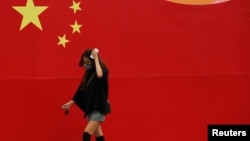As the end of the year approaches, several Chinese cities are taking heavy-handed approaches to meet their annual air pollution goals, sparking a backlash among some businesses.
Shijiazhuang, the capital of Hebei province and Lanzhou, capital of Gansu province, are two of China’s most polluted cities. They have ordered hundreds of factories to halt production until the end of the year. And the drivers of private cars in both cities also have been forced to use their vehicles on alternating days since early this week.
Some cities, like the nation's capital, Beijing, are said to be considering following suit on the driving bans as the air quality in China quickly deteriorates with the pending arrival of winter. Coal is a key energy source for heating homes, and a major pollutant.
Blue-sky policies provoke anger
While the general public welcomes the so called blue-sky polices, such last-minute tactics have angered businesses.
For example, of the seven industries in Shijiazhung where factory production was suspended, the pharmaceutical sector appears to be hardest hit. It has long been the backbone of the city’s economy.
North China Pharmaceutical Group Corp. said in a stock filing Tuesday it anticipates 50 million yuan (U.S. $7.2 million) in losses, which will force its factory to suspend production in the next 45 days.
Another manufacturer, ENN Ecological Holdings Co., estimated Monday night “it may suffer a decline of 75 million yuan (U.S. $10.9 million) in revenue" if production of its two subsidiaries is suspended for a month.
Others say the drastic move may put them out of business for good. The companies say they are worried they are financially incapable to meet the city’s tightened regulations to reduce air pollution and the release of waste water, according to local media reports.
That may lead to massive layoffs of hundreds of thousands of blue-collar workers in Shijiazhung, which has been the largest base for the manufacturing of antibiotics in China.
“This, no doubt, has pushed manufacturers to the brink of survival ... and put pressure on them to either move up value chains or risk being bankrupt,” Zhang Ruidou, an analyst with Zero Power Intelligent Group, which tracks pharmaceuticals, told VOA via email.
Zhang said amid China's economic slowdown, the pharmaceutical sector has outgrown other industries. Such gains, however, have been at the cost of the environment.
Although the government’s anti-pollution drive will have a negative impact on the pharmaceutical industry, the effect will be short-lived if the sector can turn away from the vicious “high pollution, high growth” cycle, the analyst added.
Improved air quality
Shijiazhung has consistently trailed other Chinese cities in its fine particle air quality index (AQI), and heads the list of the country’s worst polluted areas from time to time. Fine particles are believed to pose the greatest health risks.
Shijiazhung's index dropped to an average of 156 on Thursday.
The city aims to cut the annual average of its AQI by 10 percent from that of the previous year.
Along with Shijiazhung, 19 other cities, including Lanzhou, were among China's most polluted, according to official data.
Short-term 'cure'
Calling the city’s tough measures a short-term cure to improve air quality, environmental experts urged authorities to quickly determine a sustainable plan.
Ma Yongliang, professor of Tsinghua University School of Environment, said a balance must be struck between the nation’s environmental protection and economic growth.
The environment has long been sacrificed for the nation’s economic development, but now the trend must be reversed since the pollution problem has reached a critical point, according to the professor.
This doesn’t mean that the local governments’ efforts in environmental protection, however, will be made at the cost of economic growth. Ma said such efforts won’t be sustainable in the long run since no cities can afford the sudden, massive layoff of laborers.
“A long-term governance plan should be made — using this occasion as an opportunity to put some [highly-polluting] companies out of business while tightening regulations. Companies which meet the regulations should be allowed to resume production and put under heightened scrutiny in the future,” Ma told VOA.
The professor warns that an increase in the price of medicine likely will ensue as the nation’s environmental cost for manufacturers to operate is expected to surge along with the stricter environmental protection measures.
Clearing the skies
Regardless of possible price spikes, most Chinese citizens are happy to see the blankets of smog cleared from their skies.
An online survey by state-run CCTV found that about 60 percent of respondents threw their support behind the driving ban in Shijiazhuang, while another 69 percent agreed with the city government’s move to shutter factories that create pollution.
On China’s Twitter-like social media site Sina Weibo, a user named Brother Han wrote, “I’m in full support. I refuse to be a vacuum cleaner of the city’s [air pollution],” while another user urged “no more tolerance for those corrupt and polluting state-run businesses.”
Others voiced concern about the cost of cleaner skies, though, saying, “It’ll be irresponsible if the government’s move ends up triggering massive layoffs."




